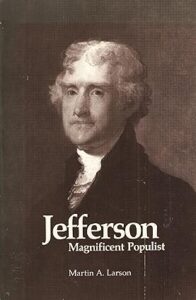To truly understand the roots of American populism, one must look beyond modern politics and into the ideas of the thinkers who shaped the nation’s foundation.
These voices—once central to national debate—are now often overlooked or misunderstood.
Yet their insights into governance, economics, and society still speak powerfully to the issues facing Americans today.
By revisiting the words and lives of these forgotten intellectuals, we uncover a deeper, richer vision of what American political philosophy once was—and what it can be again.
Understanding Jefferson Through His Own Words
Thomas Jefferson is often seen as the greatest American statesman.
To grasp his political thinking, it is best to read what he actually wrote. His ideas, expressed in his own words, offer insight no summary can match.
One of the most useful collections of Jefferson’s writings was compiled by Dr. Martin A. Larson.
His book, Jefferson: Magnificent Populist (Devin-Adair, 1985), brings together a wide range of Jefferson’s thoughts, arranged by topic for easy reference.
Reading this collection feels like hearing Jefferson speak directly. Anyone who wants to truly understand his views should start here.
Dr. Larson’s Mission to Educate the Public
Dr. Martin A. Larson was more than a scholar—he was a committed voice for economic truth.
For years, he contributed columns to The Spotlight, where he wrote about issues like the Federal Reserve, honest money, taxation, and broader financial topics.
Remarkably, he did this work without pay.
After retiring early through careful planning and wise financial choices, Dr. Larson dedicated his time to public education.
He believed The Spotlight was the best platform to reach everyday Americans with these urgent messages.
A Unique Resource Among Jefferson Biographies
While many biographies of Thomas Jefferson have been written, few offer the clarity and depth found in Dr. Larson’s collection.
For those wanting a direct and organized look into Jefferson’s thoughts, this compilation stands out as an ideal starting point.
To explore the broader roots and meaning of these movements, read Understanding Populism and Nationalism in America.
Remembering Lawrence Dennis: A Forgotten American Thinker
Another important American philosopher deserves attention. Lawrence Dennis was well-known—and often controversial—during the mid-20th century.
Yet today, many American populists have largely forgotten him.
Dennis is a key figure in the history of populist thought.
He is even featured in Willis Carto’s Populism vs. Plutocracy, highlighting his lasting influence.

A Personal Connection to Lawrence Dennis
Long before his association with Willis Carto, Michael Collins Piper had already developed a strong intellectual attachment to the writings of Lawrence Dennis.
His first in-depth exposure came through the book Prophets on the Right.
It later felt fitting that Piper would go on to work for Carto, who had personally known Dennis.
Carto credited Dennis as a major influence on his worldview, and Piper was both surprised and pleased to learn of their close connection.
The Lasting Impact of Lawrence Dennis’s Writings
Throughout his career, Lawrence Dennis published five powerful books.
Each one challenges readers to think deeply about economics, politics, and society.
His ideas remain sharp and relevant, even decades after they were first written.
His key works include:
-
Is Capitalism Doomed? (1932)
-
The Coming American Fascism (1936)
These books are filled with bold insights and provoke strong reactions.
Readers may not agree with everything Dennis wrote, but his work is guaranteed to spark serious thought.
A Long-Overdue Biography of Lawrence Dennis
Over the years, much has been written about Lawrence Dennis—some accurate, some not.
Sadly, many critics never took the time to read his actual work.
That makes the release of a thorough biography all the more valuable.
At last, a detailed account of Dennis’s life and ideas has been published.
The Color of Fascism: Lawrence Dennis, Racial Passing, and the Rise of Right-Wing Extremism in the United States (NYU Press, 2006) offers a well-researched and balanced view.
Written by Gerald Horne, the book includes many direct quotes from Dennis’s own writings and provides a long-overdue look at this complex and influential figure.
Complex Identity, Unshakable Legacy
While The Color of Fascism is a valuable and well-researched biography, it does reflect a certain personal bias.
The author, an African-American scholar, places strong emphasis on Lawrence Dennis’s racial identity and the fact that he “passed” as White, given his African-American ancestry.
Although this aspect is heavily explored, it does not take away from the book’s overall value.
Dennis’s contributions to political thought remain significant, regardless of how his heritage is viewed.
Some readers may focus on his background more than his ideas, but that reflects their own bias—not a flaw in Dennis’s work or legacy.
Honoring Forgotten Voices in American Populism
The legacy of American populism cannot be fully understood without revisiting the ideas of men like Thomas Jefferson and Lawrence Dennis.
Through Jefferson’s own words and Dennis’s bold critiques of economic and political systems, we gain access to foundational ideas that still resonate today.
While modern interpretations often miss their depth, the original writings—especially when thoughtfully compiled or revisited—offer timeless insight.
By looking back at these influential but often overlooked figures, we reconnect with a tradition of independent thinking that continues to challenge and inspire.
For a modern voice who echoed many of the same populist concerns, see Gore Vidal: Populist Rebel from America’s Elite Circles.



